Understanding your personality can be an enlightening journey, and precisionpersonality.online offers an incredibly accurate and free personality test to set you on the right path. Although personality tests might come in various forms, one particularly notable variant is the free MBTI-style test featuring 93 questions that promise an in-depth analysis of your personality. While this article won’t touch on proprietary assessments, it’s essential to explore the fascinating world of personality evaluations that delve into human psyche complexities.
What Are MBTI-Style Tests?
MBTI-style tests are based on the typological theories originally developed by Carl Jung and later expanded by Isabel Briggs Myers and her mother, Katharine Cook Briggs. These tests sort individuals into different personality types based on categories related to how they perceive the world and make decisions. The questionnaires generally assess preferences on four dichotomies: Introversion vs. Extroversion, Sensing vs. Intuition, Thinking vs. Feeling, and Judging vs. Perceiving.
The Value of 93 Questions
A test that consists of 93 questions is particularly valuable because it allows for a nuanced approach to evaluating your personality. Each question contributes to a more refined understanding of your preferences and behaviors. With a broad array of questions, such a test can more accurately capture the subtleties of your personality profile.
The Four Dichotomies in Depth
When you embark on a 93-question personality test, you’ll find yourself confronted with queries that probe each of the four major dichotomies of personality. These dichotomies help categorize aspects of your personality into broader types but remember that individuals are more than just a sum of their parts.
1. Introversion vs. Extroversion: This dichotomy assesses where you derive your energy from. Do you feel more energized by solitary activities or by interacting with others? The test will likely include questions that help you understand your preference for social situations or solitude.
2. Sensing vs. Intuition: Here, the focus is on the type of information you naturally notice. Do you pay more attention to concrete details and facts (Sensing), or do you focus more on patterns and possibilities (Intuition)? Questions might ask about how you experience the world around you or how you interpret information.
3. Thinking vs. Feeling: This metric evaluates how you make decisions. If you lean towards the Thinking side, logic and objectivity likely guide your decision-making. If you’re more of a Feeling type, personal values and the consideration of others’ feelings might be your driving forces. The test might pose scenarios to see how you navigate decision-making processes.
4. Judging vs. Perceiving: Lastly, this dichotomy looks at how you approach life. Do you prefer a structured, planned approach (Judging), or do you gravitate towards spontaneity and flexibility (Perceiving)? The questions could ask you about how you manage your time or handle unforeseen events.
What to Expect from a 93-Question Test
Engaging with a 93-question personality test, you can expect a comprehensive evaluation that offers personalized insights. The results typically come in a detailed report, outlining your main personality type and the tendencies associated with it. Such an analysis can guide personal development, career choices, and even interpersonal relationships.
Benefits of Free Personality Tests
Accessibility is one of the significant benefits of free MBTI-style tests. Everyone has the opportunity to gain a deeper understanding of their traits without financial barriers. If you’re curious about your personality type or you’re seeking personal growth opportunities, these freely accessible tests provide a valuable starting point.
Accuracy and Validation
While the convenience of a free test is undeniable, it’s essential to consider the accuracy and validation of the assessment you’re taking. Not all free tests are created equal, and while some may offer a good starting point for self-discovery, others may not be as reliable. Look for tests that cite their methods, development process, and ideally, have some form of empirical support or user testimonials that speak to their credibility.
Applying Results to Your Life
Once you’ve completed the test and received your results, the real work begins. Applying the insights you’ve gained to your personal and professional life can lead to growth and improved self-awareness. It’s important to approach your results with an open mind and use them constructively rather than as immovable labels.
Share and Compare
One of the joys of personality tests is sharing results with friends, family, or colleagues. Comparing and discussing your various personality types can be an illuminating and even bonding experience. It provides a platform for people to understand each other’s preferences and working styles better, which can be incredibly advantageous in team environments.
Continual Reflection
Personality is a fluid concept that can evolve over time. Although a free MBTI-style 93-question test can offer significant insights, it’s crucial to reflect continually and reassess your personality throughout different life stages. Self-reflection prompts growth, and periodically retaking the test can show you how you’ve changed and developed over time.
Conclusion
Free personality tests, especially those featuring a comprehensive set of 93 questions, can serve as powerful tools for self-discovery and personal growth. Although it’s crucial to assess the quality of the test you’re taking, a well-constructed personality assessment can offer a depth of insight into your character traits and preferences.
Remember, the test is just the beginning. The real discoveries come with what you do with the knowledge gained from your personality analysis. Use your results as a guide rather than a definitive verdict on who you are. As you move forward, let your understanding of yourself evolve and expand, all the while using the rich, personal data as a compass to navigate the complexities of life.



Leave a Comment